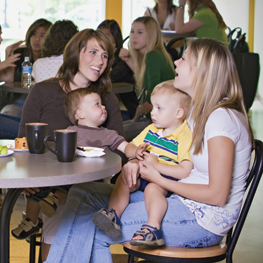
2012 was not the most promising year in the health of many parents we know. Come to think of it, neither was 2011. We witnessed everything from serious physical health issues to emotional and relationship concerns. Are we wearing down from the extra demands parents face?
After all, what parent has adequate time for personal well-being or time to show enough care for a partner? We need to plan for fitness and adjust our lifestyle for prevention. And (gasp!) we need to ensure that we are listening to our own health concerns as well as we listen to those of our children.
So how do we assess our stress?
The Canadian Mental Health Association writes in Children and the Stress of Parenting that “coping with the stress of parenting starts with understanding what makes you feel stressed, learning to recognize the symptoms of too much stress and learning some new ways of handling life’s problems.”
You know as well as I that ignoring physical health concerns or emotional concerns leads us to more issues down the road.
We can do our own mini checkups with a battery of questions that looks something like this:
How am I doing emotionally this week?
Feeling overwhelmed with life?
Feeling isolated?
Have moments of irritability, anger or rage? Or are you generally happy, just tired!
Can I access supports around me?
Can I pick up the phone, meet for coffee with a friend or talk with my partner and ask for the support I need?
How do I feel physically? Has something changed that I have been ignoring?
Is there something preventing me from healthy activities I enjoy?
Am I getting 30 minutes of daily activity?
Do I notice my heart racing at times?
What small changes would help me feel things were more under control? Organizing the playroom or clearing out the garage? Signing up for a fitness class or booking a naturopath appointment?
How can I create calm? Have I tried practicing slow breathing and slowing down my heart and mind – an approach which is reflected in both Mindfulness, www.mindfulnet.org, and HeartMath, www.heartmath.org, principles? Or do I just need a 20-minute bubble bath?
Based on your honest responses, get creative with the solutions for health and well-being. Make a list, starting with small, achievable steps and try tracking your fitness and nutrition with an app.
The Canadian Mental Health Association, www.cmha.ca, outlines strategies like taking time out for yourself, joining community groups, or groups of parents and families, practicing relaxation to manage stress, along with good nutrition, exercise and sleep. When things are feeling a bit too overwhelming, accessing parenting courses or counselling can also be helpful.
To check in on your stress level and emotional health – check out the CMHA’s Mental Health Meter self-assessment, www.cmha.ca/mental_health/mental-health-meter/#.UUJDQlckfvZ.
I have been told I am a supportive friend to those in need, but really the steps and concepts in the support I offer are simple:
• Set a plan for health and self-care
• Be proactive by accessing help and support when needed
The rest will gradually fall into place or, at minimum, things will seem more manageable in the big picture.
Carrie, MSW, RSW, is also the Founder of KinderSwag, www.kinderswag.ca.
Calgary’s Child Magazine © 2024 Calgary’s Child